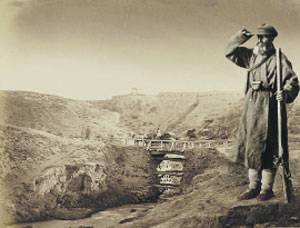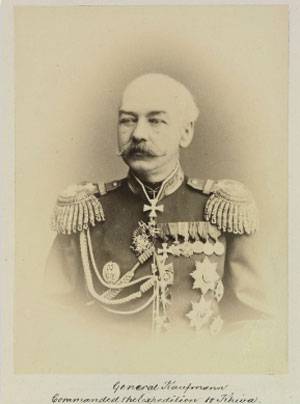Turkestan shooter
"White Sun of the Desert" has become a legend of Russian cinema. The images of comrade Sukhov, Petrukha, Said, even Abdullah turned out to be really memorable. But even against this background, Pavel Artemyevich Vereshchagin, the former head of customs, stands out. It is said sparingly about his pre-revolutionary life, but it is already clear that the man kept everyone in his fist, state power was based on him in the entire district. Vereshchagin is not afraid to go alone against a gang of armed thugs...
 In 1875, a conspiracy broke out in Kokand against Khan Khudoyar. The heir to the throne, Seid Nasr-Eddin (Nassyr-Edin), overthrew his father. He was supported by anti-Russian representatives of the Muslim clergy and a number of high officials. Seid was subordinate to the Andijan garrison (five thousand people), he was joined by units of a high-ranking dignitary Abdurakhman, and another four thousand sabers. Osh, Namangan and Asaka joined the rebellion. Soon the khan was betrayed by his own brother (the ruler of Margelan) and another son, Muhammad Alim-Bek, the commander of an infantry detachment. Khudoyar tried to fight, but the army abandoned him, leaving only a few hundred of his close associates.
In 1875, a conspiracy broke out in Kokand against Khan Khudoyar. The heir to the throne, Seid Nasr-Eddin (Nassyr-Edin), overthrew his father. He was supported by anti-Russian representatives of the Muslim clergy and a number of high officials. Seid was subordinate to the Andijan garrison (five thousand people), he was joined by units of a high-ranking dignitary Abdurakhman, and another four thousand sabers. Osh, Namangan and Asaka joined the rebellion. Soon the khan was betrayed by his own brother (the ruler of Margelan) and another son, Muhammad Alim-Bek, the commander of an infantry detachment. Khudoyar tried to fight, but the army abandoned him, leaving only a few hundred of his close associates.Khudoyar fled and escaped by a miracle: on the way he met a group of Cossacks Skobelev and Weiner, who were engaged in reconnaissance. The Khan's convoy and the Russians went together, and Weiner sent a messenger to Lieutenant Colonel Nolde, the district chief in Khujand (now Tajikistan). Somehow, the rebels learned that reinforcements were rushing to the aid of the Cossacks and stopped the pursuit.
Khudoyar was expelled, but this did not calm down. Kokand people got into the habit of attacking Russian forts. Unfortunately, now little is known about the heroes of that era. The duty of the historian is to tell at least about examples of courage that cannot be forgotten.
At the Murza-Rabat station, Stepan Yakovlev, a reserve shooter, served as a headman. The station was a tiny fort with a "garrison" of a single man. Yakovlev knew about the approach of the Kokandans, and he had enough time to leave his post. But the headman decided to repulse the enemy. He blocked the entrance with wagons and firewood, climbed the tower himself, taking with him everything weapon - two shotguns and one rifle. When the Kokand gang approached the gate, Yakovlev fired three shots.
The enemy retreated, but after waiting a little, he rushed to the fort from different sides. While Yakovlev was reloading his guns, the Kokandans broke through the gate. Stepan quickly descended from the tower, went to the bayonet and again drove the enemy back. The night passed in constant shelling of the entrance, so that Yakovlev could not fill up the breach. In the morning, the attackers changed tactics: they made sheaves of dry clover, set it on fire and began to throw them over the walls. The "garrison" took refuge in the station house, and then the enemies, destroying the roof, threw a burning clover inside. The headman rushed to the breakthrough in the hope of reaching a neighboring building, laid down several people, but died heroically, a little short of the goal - a simple soldier of a great empire. The Kokandians took his head with them.
In tsarist Russia, the memory of the hero was preserved. At the place of his death, a plate appeared with the words: “Indefinitely leave of the 3rd Turkestan rifle battalion, shooter Stepan Yakovlev. Killed by a gang of Kokandans defending the Murza-Rabat postal station on August 6, 1875. To the valiant Turkestan warrior in memory of donations from those passing by. 1877".
The plate did not last long, it was destroyed by unknown enemies of Russia. And yet, on the twentieth anniversary of the feat, a granite monument was erected to Yakovlev from the officers and riflemen of the 3rd Turkestan rifle battalion.
Feats are performed by both generals and soldiers. Unfortunately, the names of big people usually end up in textbooks, while others are gradually forgotten. This is an obvious flaw in our education system. In Soviet times, they talked a lot about Matrosov, Kosmodemyanskaya, the Panfilovites, but hushed up the pre-revolutionary heroes. It is time to correct the defect - to return to our memory all worthy people, regardless of the era in which they lived.
On the day of the death of Stepan Yakovlev, the Kokandans raided Khujand, killing several coachmen and elders, capturing 18 prisoners (most civilians). Turkestan Governor-General Konstantin Kaufman reacted in his characteristic uncompromising manner: he ordered the troops to prepare for action.
 Mikhail Skobelev, appointed to command the cavalry, took rocket launchers with him, and they came in handy in the very first clash with the enemy cavalry. Near Mahram, the Kokandans tried to envelop our right flank, but rocket fire put them into a disorderly rout. Skobelev led the cavalry forward in order to go behind enemy lines and cut off his escape route. But nothing came of it, the Kokandians retreated so quickly that it was not possible to overtake them.
Mikhail Skobelev, appointed to command the cavalry, took rocket launchers with him, and they came in handy in the very first clash with the enemy cavalry. Near Mahram, the Kokandans tried to envelop our right flank, but rocket fire put them into a disorderly rout. Skobelev led the cavalry forward in order to go behind enemy lines and cut off his escape route. But nothing came of it, the Kokandians retreated so quickly that it was not possible to overtake them.Seeing that the original plan failed, Skobelev personally rushed to the enemy and cut himself in the thick of the battle along with ordinary Cossacks. Despite the overwhelming numerical superiority, the Kokandans were confused, threw down two cannons and fled, not thinking about an organized retreat. But having received reinforcements, and Skobelev had only three hundred, including rocket men, they came to their senses. Before them stood a small Russian detachment, and they decided on a counterattack. This fight could be the last for Skobelev, but the situation was again saved by rocketmen. The battery commander approached the enemy at a distance of a shot and fired 15 missiles. This was enough to thwart the counterattack.
The victory of the Russians was complete, Mahram fell, the 60-strong army of Kokand collapsed, and its leader Abdurakhman fled among the first. Now Kaufman's path lay directly on Kokand. Khan did his best to make amends, sent gifts and ambassadors to the governor-general with apologies. The Russian general did not accept the offerings and said that he would not speak with the ambassadors, but personally with the khan. Local residents greeted our army with fruits, merchants came from Kokand with refreshments for the soldiers, and the khan hastily released the previously captured Russian subjects.
In captivity, Kaufman's soldiers found the infant daughter of Dr. Petrov. The child saw how his father was beheaded, and she herself was afraid of reprisals all the time. Upon learning of this, Tsar Alexander II ordered all the children of Petrov (there were three of them) to be taken from the budget.
Our army advanced towards Kokand without much interference, and in early September 1875 Skobelev entered the city with Cossacks, artillery and rocket launchers. A little later, Kaufman occupied the capital, but the war continued: Margelan had yet to be taken, where Abdurakhman was hiding with the remnants of the troops. But he, as soon as our people reached Margelan, again fled, this time towards the mountains, to the Min-Tyube tract. Skobelev had to catch the scoundrel.
The Russian commander took a whirlwind through the territories still in the hands of the rebels. The troops loyal to Abdurakhman were demoralized and left their leader en masse. In the end, only a handful of henchmen remained with him. And although Abdurakhman could not be caught, his army ceased to exist. It seemed that the enemy would no longer rise, and Skobelev stopped the pursuit.
The result of Kaufman's campaign was a peace treaty with Kokand, according to which the Namangan Beyship departed to Russia, but then Abdurakhman showed up in Andijan, gathering 70 thousand supporters. The war broke out with renewed vigor. How not to remember the saying about the uncut forest, which always grows again?
This time, Kaufman instructed Skobelev to reconnoitre the fortifications of Andijan, and entrusted the command of the assault to General Trotsky. Throughout the city, the rebels set up blockages and barricades, our detachment was fired from behind every stone and corner ... It became clear that Abdurakhman did not even think of giving a pitched battle, but relied on exhausting street battles. Then Trotsky ordered the city to be set on fire and subjected to artillery fire. After that, he considered his task completed, and the rebels punished.
Information